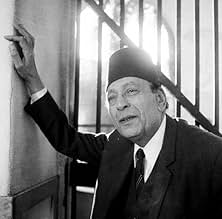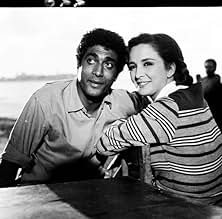अपनी भाषा में प्लॉट जोड़ेंYehia is a young man living in the cosmopolitan Alexandria during World War II. Inspired by American movies and Shakespeare, he aspires to be an actor, but struggles to pursue his Hollywood ... सभी पढ़ेंYehia is a young man living in the cosmopolitan Alexandria during World War II. Inspired by American movies and Shakespeare, he aspires to be an actor, but struggles to pursue his Hollywood dream, given the constraints of his life in the middle class and the horrors of war.Yehia is a young man living in the cosmopolitan Alexandria during World War II. Inspired by American movies and Shakespeare, he aspires to be an actor, but struggles to pursue his Hollywood dream, given the constraints of his life in the middle class and the horrors of war.
- पुरस्कार
- 2 जीत और कुल 2 नामांकन
- Ibrahim
- (as Ahmed Zaky)
- Mohsen's Father
- (as Farid Chawky)
- Qadri
- (as Mahmoud El Meligui)
- Shaker
- (as Ezzat El Alayli)
फ़ीचर्ड समीक्षाएं
The film, set during World War II tells multiple stories, one being Chahine's own story through the character of Yehia (played excellently by Mohsin Mohieddene), a young man in Egypt with directorial ambitions but the passion to be an actor, who frequently watches the same film repeatedly at his local cinema out of fear that he missed something the first time, performs Shakespeare, struggles with social and familial pressures, falls in love, and pursues his dream of studying acting at the Pasadena Playhouse. This is the film's main story, but subplots include a Jewish-Muslim romance where the female character is pregnant, a homosexual romance between a gay English soldier and a wealthy Arab, and a wacky, often funny plot featuring a group of communists who plan to kidnap Winston Churchill in hopes of ending the war.
Though certainly not Chahine's first controversial film (his masterpiece "Cairo Station" was banned for twelve years in Egypt after its first run of screenings in 1958, and understandably so, being a film about a sexually frustrated, handicapped fetishist), "Alexandria Why?" created quite the furor in conservative Islamic Egypt upon first release, it made bold statements on global politics, suggested (truthfully) corruption in Egypt's political structure, supported communism, and featured a homosexual relationship between a British soldier and a wealthy Arab, among other taboos. Chahine designed his script not only to tell the story of himself as a young man, but to tell his story as part of a bigger one, the story of the social and political climate in Alexandria, and the story of what he clearly believes to be incorrectly considered social taboos come to life. This is a brave and challenging film which affected me more than most films I've seen recently, all the more surprising since I thought it was a lacking effort from a director whose films are generally quite brilliant.
The words 'stock footage' have negative connotations in any film fan's mind because it is so often used ineptly, but here the stock footage of WWII used brings the war to life at an appropriate distance and is edited cleverly and realistically into the film, so we never feel that we are watching a cheap production. That said, the overall production design on this fairly low-budget film is minimal, but when the film does look expensive in about three or four scenes, the money is used well. Unfortunately Chahine slips into some unfortunate mistakes like using footage from "An American in Paris" when that film was released several years after the Second World War ended. The photography is on occasion sloppy, but more than often it is precise and adds a lot to the mood of the film. There is not much of an original score used in the film as Chahine prefers to use a variety of music clips from various sources to suit whatever point the film is at. The music works perfectly with the film, but it so varied I cannot imagine it would make good listening as an album.
Ultimately it is the film's occasional sloppiness that lets it down, as well as Chahine's tendency for complex plotting. This would have been perfect as a two hour film about Chahine as portrayed through the character Yehia, but his desire to comment on more than himself brings the film's quality down. Its script is excessive and often incoherent, and although there are some exceptionally shot scenes like that in which Yehia directs his first theatrical performance, the film on a whole is more remarkable for its ambition, scale, viewpoint, and characters than the end product. It is muddled and messy at times, worth watching but certainly not Chahine's best as sometimes named by critics. Chahine's later films in his autobiographical trilogy, "Egyptian Story" and "Alexandria Again and Forever" are better ways to appreciate Chahine's cinema and the character Yehia, as is his very best, most original, and bravest film "Cairo Station", which I honestly consider one of the great masterpieces of cinema.
7/10
Besides the main storyline revolving around Yehia, the script attempts to juggle multiple subplots but hits only a few barricades in the process. For one thing, it lacks a smooth flow due to muddled editing, resulting in some distracting shots. For another, it's unpolished when it comes to its tonality, as if the film regularly tries to attune itself to the characters focused-on at certain moments, coming across as out of place. Additionally, Chahine seems to adopt here more than one cinematic style, the thing that made the movie feel inconsistent. Then again, I think Chahine successfully managed, by and large, to squeeze all these characters, with their own plot threads, under the umbrella of WWII, which provides the backdrop of the story.
Alexandria... Why? Is an ambitious and clever effort, which shows in every inch of its mosaic structure and artistic decisions. Cheerful music played over scenes interspersed with footage showing destruction to emphasize that war has become an essential part of their life, while underscoring the nefariousness of their world in a comedic light, and POV shots that involve us in Yehia's dreams. It's a film of cosmopolitan proportions; centring around British occupation yet flicking through other parts of the globe, all while being quintessentially Egyptian, even giving singularity to each household of different cultures and classes. Occasionally, it may feel a pretentious, jumbled mess or a pastiche of Italian cinema - with Fellini being the main inspiration, for sure - Mostly, though, it's a dramatic allegro of making the most of one's opportunities, executed at full throttle with a comedic vein running throughout, cemented by a genius ambiguous ending.
क्या आपको पता है
- ट्रिवियाThis was the first of Youssef Chahine's autobiographical films.
- कनेक्शनFeatures Born to Dance (1936)
टॉप पसंद
- How long is Alexandria... Why??Alexa द्वारा संचालित





























